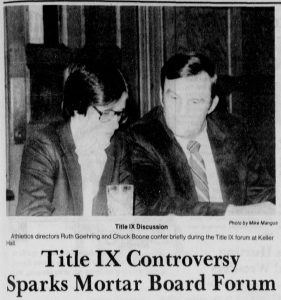During the Fall 2017 semester, 15 students took RHCS 412 Digital Memory & the Archive, a course exploring the intersections of history, memory, and archival research into UR history. The final project for this course was a team effort to use archival materials and other resources to craft a narrative related to the Race & Racism at the University of Richmond Project. Using archival materials, Katie Brennan, Elizabeth Mejía-Ricart, and Alexa Mendieta created a digital exhibit exploring the implementation of Title IX at the University of Richmond, and the lawsuit the university filed against the Department of Education in 1981 to avoid Title IX regulations. The university ultimately won this court case, stalling gender equity in college athletics at the University of Richmond and beyond. In their own words:
Compliance of Title IX guidelines was not fully finalized until the 2000s. As this exhibit has presented, while in the later years there was a conscious effort to strive towards an equal environment for female and male athletes, for many years before there was a conscious effort to deny and avoid to follow the regulation. Although it is important to highlight the progress made by the university in the recent decade, the magnitude of this progress cannot be fully appreciated unless we explore the setbacks and challenges faced by the university.
Kaitlin Brennan is a senior from Fairfield, Connecticut majoring in PPEL and Rhetoric & Communication Studies. Elizabeth Mejía-Ricart is from Santo Domingo, Dominican Republic. She is a sophomore at the University of Richmond who is double-majoring in Economics and Mathematics. Alexa Mendieta is senior from Apache Junction, Arizona majoring in Rhetoric and Communication Studies.
Click here to check out their exhibit “The Title IX Controversy at UR” on memory.richmond.edu

